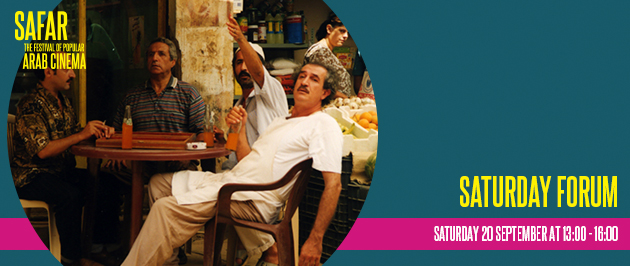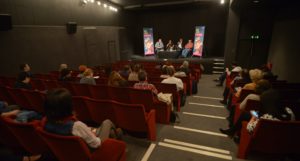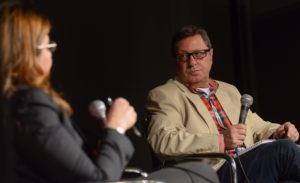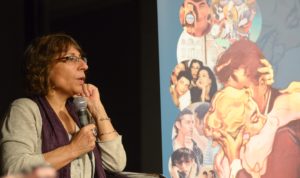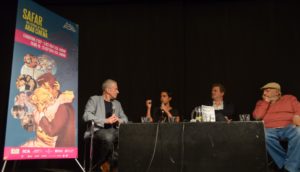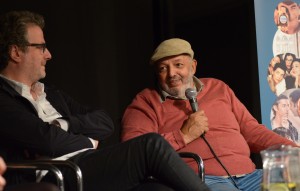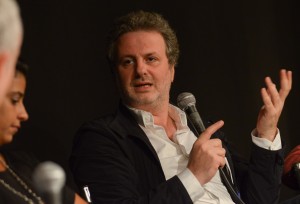The Saturday Forum | 20 September 2014
Safar’s Saturday Forum at the ICA featured three sessions where theorists and directors dissecting the making and the impact of the 2011 revolutions on Arab filmmaking. The first of the three hour-long sessions opened with Dr Malek Khouri, a professor of film studies at the American University in Cairo and author of The Arab National Project in Youssef Chahine’s Cinema(2010), in conversation with Dr Zahera Harb, a journalist, Senior Lecturer in International Journalism at London’s City University and author of Channels of Resistance in Lebanon (2011).
Whenever the word ‘popular’ is attached to Arab film, the inevitable question arises: popular to whom – those audiences in the countries where the film is made or foreign audiences at international festivals? For Harb, Egypt has always been the exception; their priority is how their films will be received at home.
After the 2011 uprising, she asked Khouri, ‘are they suffering from the Hollywoodization of stories?’ He explained that the industry might have lost an edge but not its political persuasion in its broadest sense. ‘In the last three years after the revolution, the trend among major filmmaker is not to cater to local audiences but to Western ones. The adoption of Orientalist filmmaking does not appeal to local audiences. These films reflect what the West knows about the Arab world and not how the region sees itself.’
There is a similarity, according to Harb, between some films from the region and Latin American cinema of the 1960s and 1970s in the way that they captured the diversity of their society. There wasn’t just one view.
Khouri maintained that identity in the Middle East is understood ‘in terms of heterogeneity’ – not just the easy stereotyping that characterises the region as a mono-cultural/religious (i.e. Islamic) whole. Egyptian movies represented the first cinema culture to show the working poor and the division between rural and urban existence.
He continued, ‘Arab cinema is always political, no matter the genre or its approach. By nature Arab cinema is anti-colonial, simply a reflection of the Arab world today, a social and political entity that has been struggling for national liberation.’
For him, the Safar Festival presents a totally alternative outlook because of its emphasis on popular cinema, for homegrown audiences.
*****
The second session, moderated by writer Nesrine Malik, was a panel discussion on ‘Revolutionary and Revolution in Cinema’ with Dr Viola Shafik, a filmmaker, curator and author of Arab Cinema: History and Cultural Identity, and the writer and director Sara Ishaq. With these two filmmakers, the discussion turned to their individual reactions when the Arab Spring or Arab awakening took place in 2011 – or the Arab purgatory, as Shafik mischievously offered. She didn’t want to touch a camera, and many of her colleagues felt the same way. Meanwhile Ishaq, in Yemen, reached for hers and produced the 2011 Oscar-nominated documentary Karama Has No Walls. It concerned the Juma’at El-Karama (Friday of Dignity) massacre on 18 March 2011, in Sana’a, as well as a memoir documentary released earlier this year, The Mulberry House.
When the uprisings started in Yemen, Ishaq admitted, there had been ‘a kneejerk reaction’ and ‘this encouraged anyone who had a camera to document.’ In her estimation, ‘These images are not cohesive films; they are film testimonies. People wanted to see what was happening.’ She felt that for a film made at a time of increasing insecurity in Yemen, The Mulberry House is, in her words, ‘more groundbreaking. A lot of what is being discussed is the transformation of the family unit with a camera in private space over the course of a year and a half.’
In the discussion about the role of new media, Shafik explained that the region has always been open to new technologies. The Lumière Brothers held their first public screenings of their films back in the nineteenth-century in France and three months later there were public screenings in North Africa. With the rise of cinema and TV and mass media culture in the Middle East, new media has acted as a catalyst and active factor. She posed a question to the audience that others had posed to her, ‘Was the revolution triggered by virtual reality or was virtual reality triggered by revolution?’ Her conclusion: ‘Media liberates people.’
*****
The third and considerably more raucous session was chaired by the journalist and author Brian Whitaker, former Middle East editor of the The Guardian. Joining him onstage were three film directors, Mohamed Khan, the director of Factory Girl (2013), his daughter Nadine Khan, who directed Chaos, Disorder (2012) and Khalil Joreige, who with Joana Hadjithomas, codirected Around the Pink House (1999).
Mohammed Khan talked about the ‘reinvigorated realism’ of his films beyond the walls of the studio. He set his film Factory Girl, the working class homage to Egyptian film diva Soad Hosni (1943–2001) in a clothing factory. During his Q+A after the film was screened the previous evening, he said that Soad’s spirit remained inspirational and her pictures were carried during the 25 January Revolution.
When Whitaker asked him if having so many women in his film is an attraction, Mohammed Khan snapped good-heartedly, ‘Definitely!’ Then he added, ‘I don’t see myself as a social reformer, commenting on the state of affairs. I want to tell my story within a real place so it becomes believable.’ He doesn’t use recognised stars in his films and liked the chemistry between the professional actors and ordinary people. He felt it makes the characters more credible.
There is some of her father’s approach in Nadine Khan’s filmmaking. She, too, incorporates ordinary people among actors in her debut feature film Chaos, Disorder. She told Whitaker that although it is set in a district of Cairo near a garbage dump, it should not be read as emblematic of real life Egypt. She is making a comment on any kind of enclosed community, one that is inward looking or gated. In fact she drew her references from poor communities she saw in Syria, Lebanon and Egypt and from the American television series M*A*S*H. She is in effect creating truth through lies.
Whitaker described the look of Chaos, Disorder as ‘a brutal socialist reality that was at the same time surrealist with the same visually washed out colours.’
‘I wanted to create a world of my own,’ revealed Nadine, ‘with its own rules, noises, language and part of it is the loud speaker. I needed a specific architectural space and when I couldn’t find it, we bought a piece of land and built it.’
Joreige, the co-director of Around the Pink House, swung the afternoon back to the concept of ‘the popular’. Pink House was the first film that he and Hadjithomas had made, in Beirut. In 1999 they didn’t know how to do films and Pink House featured 23 main characters and no hero. He and Hadjithomas began working together as artists. He described her as the political scientist and himself as a philosopher. He said that their arguments can become quite heated but they are always fun to watch. Since Pink House they have made nine films.
Joreige and the other directors had the audience in uproar when they told their stories of meeting the censor. Nadine Khan’s script for Chaos, Disorder had been turned down in 2010 by the Hosni Mubarak government. It was approved soon after the 25 January Revolution but would probably not have been allowed in today’s harsher climate.
Her father had a film that could not have been made unless the head of security advised him on a few minor adjustments, one included filling up an empty Egyptian refrigerator. Joreige told a story about a lady censor’s objection to a tastefully alluded to blowjob in a film. The censor complained that after the fact the female character took out a tissue and wiped her mouth, so it obviously wasn’t a pleasurable experience. He observed that when you’re dealing with censors you’re dealing with people. So anything can happen.
*****
The audiences attending the Safar screenings include film enthusiasts and people who have never watched an Arab film, and liked what they saw. At Joreige’s Q+A after the Saturday 19th September screening of Around the Pink House with Safar’s artistic director Omar Kholeif, a member of the audience suggested that his film encapsulated, for her, that tricky Arab Spring. There was so much optimism in the beginning and then destruction at the end. She said she was asking the question to the philosopher in him.
He replied, ‘You called me a philosopher instead of a prophet. Watching a film is a reading in the present. A film is never a speech. The film has to generate its own life in the spectator. This is what is wonderful about cinema. It is not in my hands anymore.’
– Malu Halasa

